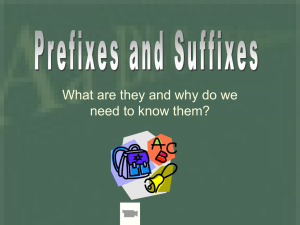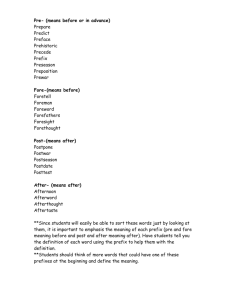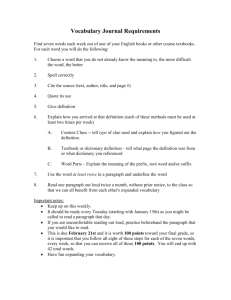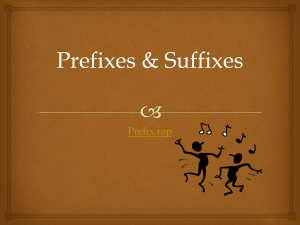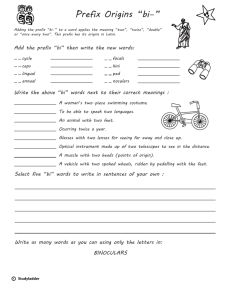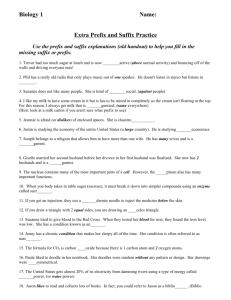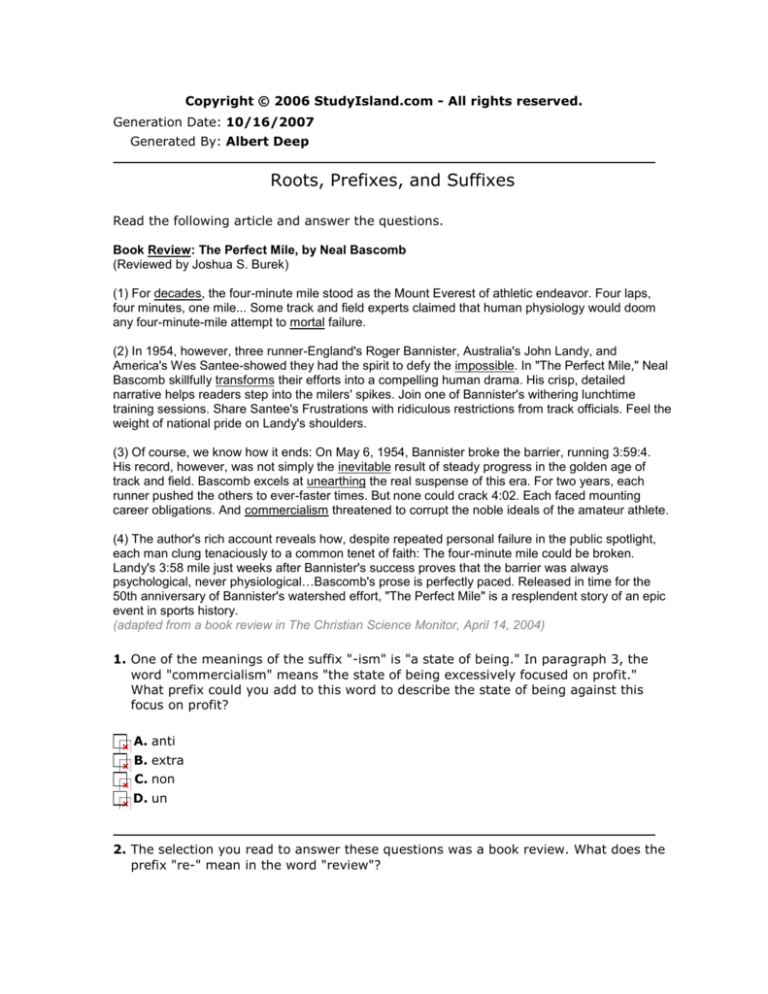
Copyright © 2006 StudyIsland.com - All rights reserved.
Generation Date: 10/16/2007
Generated By: Albert Deep
Roots, Prefixes, and Suffixes
Read the following article and answer the questions.
Book Review: The Perfect Mile, by Neal Bascomb
(Reviewed by Joshua S. Burek)
(1) For decades, the four-minute mile stood as the Mount Everest of athletic endeavor. Four laps,
four minutes, one mile... Some track and field experts claimed that human physiology would doom
any four-minute-mile attempt to mortal failure.
(2) In 1954, however, three runner-England's Roger Bannister, Australia's John Landy, and
America's Wes Santee-showed they had the spirit to defy the impossible. In "The Perfect Mile," Neal
Bascomb skillfully transforms their efforts into a compelling human drama. His crisp, detailed
narrative helps readers step into the milers' spikes. Join one of Bannister's withering lunchtime
training sessions. Share Santee's Frustrations with ridiculous restrictions from track officials. Feel the
weight of national pride on Landy's shoulders.
(3) Of course, we know how it ends: On May 6, 1954, Bannister broke the barrier, running 3:59:4.
His record, however, was not simply the inevitable result of steady progress in the golden age of
track and field. Bascomb excels at unearthing the real suspense of this era. For two years, each
runner pushed the others to ever-faster times. But none could crack 4:02. Each faced mounting
career obligations. And commercialism threatened to corrupt the noble ideals of the amateur athlete.
(4) The author's rich account reveals how, despite repeated personal failure in the public spotlight,
each man clung tenaciously to a common tenet of faith: The four-minute mile could be broken.
Landy's 3:58 mile just weeks after Bannister's success proves that the barrier was always
psychological, never physiological…Bascomb's prose is perfectly paced. Released in time for the
50th anniversary of Bannister's watershed effort, "The Perfect Mile" is a resplendent story of an epic
event in sports history.
(adapted from a book review in The Christian Science Monitor, April 14, 2004)
1. One of the meanings of the suffix "-ism" is "a state of being." In paragraph 3, the
word "commercialism" means "the state of being excessively focused on profit."
What prefix could you add to this word to describe the state of being against this
focus on profit?
A. anti
B. extra
C. non
D. un
2. The selection you read to answer these questions was a book review. What does the
prefix "re-" mean in the word "review"?
A. after
B. write
C. once
D. again
3. In paragraph 2, the word "impossible," what does the prefix "im-" mean?
A. before
B. under
C. after
D. not
4. In paragraph 1, what does the prefix "deca-" mean in the word "decades"?
A. years
B. apart
C. ten
D. decadent
5. In paragraph 2, the word "transforms," what does the prefix "trans-" mean?
A. to cross
B. to form
C. to change
D. to shape
6. In paragraph 3, using your knowledge of the prefix "un-," what is the meaning of the
word "unearthing"?
A. uncovering
B. putting dirt on top of
C. leaving the earth
D. digging a hole in
7. In paragraph 1, what does the root of the word "mortal" mean?
A. life
B. death
C. failure
D. related to
8. In paragraph 3, the word "inevitable," the prefix "in-" means "not," and the suffix "able" means "capable of." Based on this knowledge, which of the following is the
literal meaning of the word "inevitable"?
A. unlikely it would ever happen
B. able to not necessarily happen
C. might happen and might not
D. incapable of being avoided
Read the following selection and answer the question.
Calling All Stunt Pilots to Catch Solar Dust
by Mark Sappenfield, staff writer
(1) Oakland, CA - Somewhere over a wide stretch of Arizona desert tomorrow morning, the Jet
Propulsion Laboratory will perform its best impersonation of James Bond.
(2) For a scientific facility best known for shipping six-wheeled rovers to Mars and flinging probes to
the far corners of the solar system, the terrestrial exercises might seem a bit mundane. Then again,
none of those missions ever involved stunt pilots or helicopters snatching a space probe from midair.
(3) If all goes as planned, two helicopters will do just that…Actually, tomorrow is just a test run for
the real thing, which will take place in September, but it is one of the final steps toward a feat that
has never been attempted in the name of science.
(4) The dramatic catch is necessary because of this mission's precious cargo: samples of solar dust
that must not be shaken or stirred by a rough landing. But it also marks a frontier in space
exploration.
(5) This will be the first sample of space material returned to Earth since Apollo 17 came back from
the moon in 1972. Other samples, however, will follow-from comets and asteroids and even Mars-as
scientists seek to bring extraterrestrial materials back to Earth, where the full array of scientific
instruments can be brought to bear on every rock and cosmic mite.
(article from The Christian Science Monitor, April 14, 2004)
9. In paragraph 2, what does the prefix "mid-" mean in the word "mid-air"?
A. in zero gravity
B. with
C. above or below
D. in the middle of
10. In paragraph 4, what is the root of the word "exploration"?
A. explain
B. explorer
C. exploratory
D. explore
11. The root word "terra" means earth. Using this knowledge, what does "terrestrial
exercises" in paragraph 2 refer to?
A. Exercises by beings who are not from Earth
B. People who do exercises upon Earth
C. Machines that are used to study Mars
D. Exercises that are performed upon Earth
12. In the word "extraterrestrial," in paragraph 5, the root word "terra" means earth.
What does the prefix "extra-" mean?
A. outside of
B. next to or beside
C. inside of
D. additional
13. In paragraph 1, what is the root of the word "impersonation"?
A. person
B. personal
C. personate
D. impersonal
14. In paragraph 5, the word "asteroid" refers to a small celestial (meaning "of the
heavens") object. The root word "aster" comes from the Greek for "star." What can
you guess is the literal meaning of the suffix "-oid"?
A. into
B. of the
C. like
D. comet
For decades, the creative minds at Disney have been the experts on fantastic voyages, taking
children of all ages to magical kingdoms and enchanted seas. But when they wanted to send people
rocketing towards Mars, they called NASA.
"Mission: SPACE" officially opens at Walt Disney World's Epcot on Oct. 9. Disney touts the ride
as their most technologically advanced attraction ever, relying on visual imaging, motion control, and
centrifuge technology to send would-be astronauts on a futuristic voyage to the red planet. But it also
relies on input from NASA advisors to create what the ride's co-producer, Susan Bryan, calls "a mix
of real science and thrill."
When they arrive at Mars, the pseudo-astronauts will see a landscape based on NASA imagery
taken by several spacecraft over the past two decades, provided to Disney by the agency's Jet
Propulsion Laboratory (JPL) in Pasadena, California.
NASA's Michelle Viotti, who worked on the project at JPL, says the result is a "cross between the
realistic and artistic. They took the planetary geologists' knowledge and abstracted from that."
"We're really trying to make Mars a real place, as familiar as your backyard," Viotti says. "This
ride brings it home and makes it real."
Talks with JPL engineers also led to Disney computer models of Mars rovers, another sign, as
Viotti says, that the Imagineers were "really great about wanting to have a sense of reality behind
their ride." Viotti says it's great "to partner with somebody who reaches people," especially those in
Florida, where launches every 26 months make the state a "Gateway to Mars."
Humans may someday follow their robotic predecessors through that Gateway, and it's possible
that a child alive today will command the first mission. Who knows, the future astronaut may even be
driven toward that goal by the NASA-esque fiction of "Mission: SPACE."
adapted from http://www.nasa.gov/vision/earth/everydaylife/mission_space.html
15. What does the suffix mean in the term "NASA-esque" in the last paragraph above?
A. Resembling
B. Unlike
C. Old
D. Trained
Answers
1. A
2. D
3. D
4. C
5. C
6. A
7. B
8. D
9. D
10. D
11. D
12. A
13. A
14. C
15. A
Explanations
1. Both un- and non- mean "not," which is a little different than "against." Anti- is
the only prefix among the choices that means "against," as in antidemocratic or
anticommunist.
2. To review literally means "to view again," or "to take another look at." The writer
had to take another look at this book in order to write his analysis of it. There are
many other words that use this prefix, such as rejoin, repopulate, reauthorize,
and reappoint.
3. The prefix im- can mean different things, depending on the word, so you might
need to look at the context if the word is unfamiliar to you. In this case, think of
a word like imbalance, meaning "not balanced." Similarly, impossible means "not
possible."
4. Think of other words you know that have this prefix. For example, you may know
that a decathlon is ten track-and-field events, or that a decameter is ten meters.
Also, you probably know that a decade is ten years, so you can guess that decameans ten.
5. You probably know that the word transform means to change shape or
appearance. You can guess that form probably means "shape," and from there
you can also figure out that trans- means to change, as in transpose--"to change
the position of." Trans can also mean "across," as in transatlantic.
6. You probably know that un- means "not," but it can also mean "remove," as in
the word unmask. The word unearthing literally means "to remove the earth
from" or "uncover."
7. The word mortal can either mean human (such as in the phrase "mere mortals")
or it can mean fatal, as in "he delivered a mortal blow." But the root of the word,
mort, means death. Therefore a mortal is "one who can die," as opposed to
someone who is immortal and never dies. In the context of this article, "doomed
to mortal failure" means that people thought no one could break the four-minute
mile barrier and survive it.
8. Knowing the meaning of prefixes, suffixes, and root words can help you figure
out the meanings of less familiar words. Even though we rarely use the opposite
word, evitable, which means capable of being avoided, the clues in the questionplus the fact that you may have heard the word before--should help you
determine that inevitable means incapable of being avoided.
9. If you get stuck on this one, think of other words you know that use the prefix
mid-: You know that midnight means "in the middle of the night, and midday
means in the middle of the day. You can guess that mid-air means "in the middle
of the air."
10. To find the root word, look for the smallest word you can make from the largest
word (you may sometimes have to add a letter or two). It should be a smaller
word that the meaning of the larger word is based on. To explore means to
investigate, so an exploration refers to an event in which something is
investigated.
11. Terrestrial literally means "of or related to earth or its people." So terrestrial
exercises are exercises "of the earth," which sounds funny. So instead we might
say "exercises that are performed upon the earth," as opposed to Mars, the
moon, etc.
12. To figure this one out, think of other words you know that start with the prefix
extra-. For example, you know that extracurricular means "outside of school."
Extraterrestrial refers to anything that originates or exists "outside of" the earth
or the earth's atmosphere.
13. Usually, the root word is the smallest complete word within a larger word. The
root is the basis for the meaning of the larger word. In this case, you already
know what a person is; an impersonation is an imitation of a person. It usually
refers to one person pretending to be the other person, in manner, speech,
and/or clothing. In the case of this article, it's the pilots who will be
"impersonating" James Bond by performing some daredevil feats.
14. You were given lots of clues in the question to help you solve this. You are told
that an asteroid is a small heavenly object and that aster means star. The suffix
-oid means like, so that the root word and the suffix together mean "star-like."
15. The suffix "-esque" means "resembling," or "inspired by." To determine this
meaning, you can look to clues in the text. We know that NASA worked with
Disney to make the ride remind people of real NASA missions. Thus, the best
answer choice is "resembling."
Copyright © 2006 StudyIsland.com - All rights reserved.

